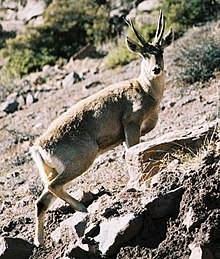| Hippocamelus | |
|---|---|

| |
| The taruca | |
| Scientific classification | |
| Domain: | Eukaryota |
| Kingdom: | Animalia |
| Phylum: | Chordata |
| Class: | Mammalia |
| Order: | Artiodactyla |
| Family: | Cervidae |
| Subfamily: | Capreolinae |
| Tribe: | Odocoileini |
| Genus: | Hippocamelus Leuckart 1816 |
| Type species | |
| Hippocamelus dubius Leuckart, 1816
| |
| Species | |
| |
Hippocamelus is a genus of Cervidae, the deer family. It comprises two extant Andean and two fossil species. The living members are commonly known as the huemul (from the Mapuche language), and the taruca, also known as northern huemul.
Both species have a stocky, thick, and short-legged body. They live at high altitudes in the summer. Though Taruca spends their whole life cycle at these high altitudes, especially as populations get nearer the Ecuator line, Southern Huemul, moves down the mountains in the fall and spend the winter in sheltered forested valleys.
Areas with fresh water are preferred. They are herbivores that feed primarily on herbaceous plants and shrubs as well as sedges, lichens, and grasses found between the rocks on high peaks. They are active during daytime and have a lifespan of about ten years.[citation needed]